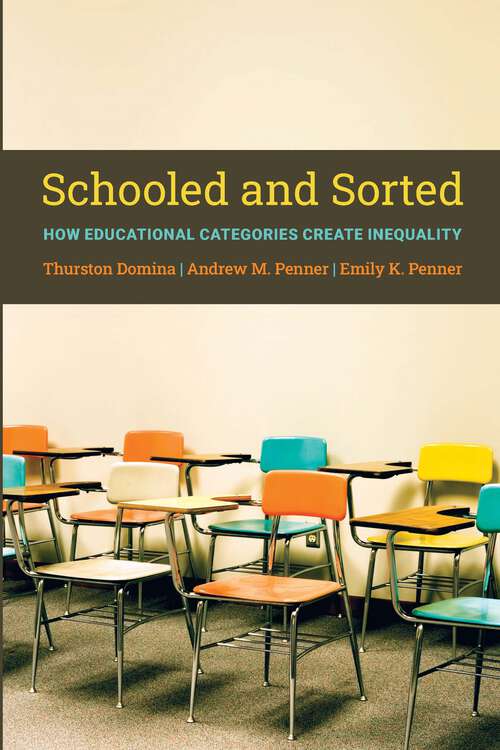Schooled and Sorted: How Educational Categories Create Inequality
By: and and
Sign Up Now!
Already a Member? Log In
You must be logged into Bookshare to access this title.
Learn about membership options,
or view our freely available titles.
- Synopsis
- Society primarily views education as a way to teach students skills and knowledge that they will draw upon as they move into their adult lives. However, schools do more than educate students – they also place students into categories, such as kindergartner, English language learner, and honor roll student. But do these categories have larger consequences than simply sorting students into classrooms? In Schooled & Sorted Thurston Domina, Andrew M. Penner, and Emily K. Penner, explore how educational categories reify and reinforce powerful existing social categories – including race, ethnicity, and class – and ultimately reproduce social and economic inequality in broader society. Domina and colleagues argue that while education is often seen as a tool for social mobility and reducing inequality, categories used in schools shape students’ access to resources, which ultimately have far-reaching impacts on their lives. The authors assert that the classes students are sorted into influence their educational experiences – students who are placed in higher-tracked classes are believed to have stronger academic skills than students in lower-tracked classes. As a result, more resources are often devoted to students in higher-tracked classes. Because many measures of academic achievement reflect values of the status quo, white, affluent students are overrepresented in these track assignments, leading to a reproduction of societal status and resource inequality within schools. This inequality within schools translates into lasting inequalities in the adult world. Society views educational achievement to be based on merit – high achievers have done well because they worked hard and are rewarded with resources, status, and power, including high-paying, high-status jobs at prestigious organizations. Those with lower educational status, on the other hand, are seen as undeserving and are therefore sorted into lower-paid jobs in lower-status professions and hold less influence. Domina and colleagues contend, however, that while educational categorization is unavoidable, a more equitable system, and thus a more equitable society, can be built. A key component is to build and uphold categories that emphasize educational goods that are inherently valuable, such as the ability to read, as opposed to those that derive value from scarcity, such as status and prestige. Schooled & Sorted is an illuminating investigation into the ways sorting within schools translates to sorting – and inequality – into the larger world.
- Copyright:
- 2023
Book Details
- Book Quality:
- Publisher Quality
- Book Size:
- 294 Pages
- ISBN-13:
- 9780871540003
- Publisher:
- Russell Sage Foundation
- Date of Addition:
- 06/22/23
- Copyrighted By:
- Russell Sage Foundation
- Adult content:
- No
- Language:
- English
- Has Image Descriptions:
- No
- Categories:
- Nonfiction, Education, Philosophy, Politics and Government, Sociology
- Grade Levels:
- Eleventh grade
- Reading Age:
- 11 and up
- Submitted By:
- Bookshare Staff
- Usage Restrictions:
- This is a copyrighted book.
Reviews
Other Books
- by Thurston Domina
- by Andrew M. Penner
- by Emily K. Penner
- in Nonfiction
- in Education
- in Philosophy
- in Politics and Government
- in Sociology
